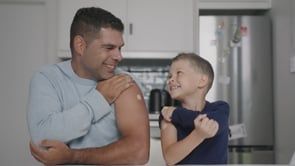COVID-19 information for Aboriginal communities
Information for Aboriginal people and communities on COVID-19 to help keep you and your community safe.
Additional 2023 COVID-19 vaccine dose (booster)
1 September 2023 – The Australian Technical Advisory Group on Immunisation (ATAGI) has recommended some people at higher risk of severe illness get an additional 2023 COVID-19 vaccine dose (booster) if eligible. Read what the latest advice from ATAGI means for you.
Simple steps to protect yourself
Speak to your doctor before you get sick
Understand what test to do when you feel unwell
Check if you're eligible for antiviral medicines
Stay up to date with recommended vaccinations
Protecting our mob from COVID-19
The best way you and your family can stay well and keep doing the things you love is to:
- Stay home if you’re unwell and until your symptoms have gone.
- Stay up to date with recommended vaccinations. This includes the flu shot.
- Get together outdoors or in well-ventilated indoor spaces.
- Consider wearing a face mask in crowded, indoor places.
- Consider doing a rapid antigen test (RAT) before visiting others.
- Continue to attend any medical appointments you may have.
- Have a yarn with your doctor, Aboriginal Medical Service or Aboriginal Health Worker now so you understand your options if you get COVID-19 symptoms, including what test you should get if you get sick, and whether they recommend you have antiviral medicine.
By taking these steps, you can help keep you and your loved ones safe.

Keep our mob safe
Vaccinations for Aboriginal and Torres Strait Islander people
Stay up to date with recommended COVID-19 vaccinations to help keep your immunity strong, even if you have already had COVID-19.
You may be eligible to get an additional COVID-19 vaccination. For more information visit COVID-19 booster vaccination or talk to your doctor, Aboriginal Medical Service or vaccination provider about your needs and your vaccination options.
The best way to avoid flu this winter is to get a flu shot. Free flu shots are available for all Aboriginal people aged 6 months and over.
Book your vaccination
To book your COVID-19 vaccination contact your local doctor, Aboriginal Medical Service, vaccination provider or the online Healthdirect Service Finder.
If you have any questions about the COVID-19 vaccines, have a yarn with your doctor, pharmacist, Aboriginal Medical Service or Aboriginal Health Worker.
Getting tested for COVID-19
Aboriginal and Torres Strait Islander people aged 30 and over with additional risk factors can be at risk of severe illness from COVID-19.
If you have COVID-19 symptoms (runny nose, sore throat, cough or fever), contact your doctor for testing advice.
If you can't contact your doctor, call Healthdirect on 1800 022 222 or use the online Service Finder to find a doctor near you.
If your doctor recommends a COVID-19 PCR test, they will give you a pathology referral form for a free COVID-19 PCR test.
The referral form will have a private pathology provider location on it which you will need to visit so you can get tested.
For more information on getting tested, visit What COVID-19 test should I do?
If you test positive to COVID-19
While it is not mandatory to self-isolate if you test positive to COVID-19, it is recommended that you stay at home and take steps to protect others.
If you have tested positive for COVID-19, it is important to contact your doctor or Aboriginal Medical Service and let them know about your positive test result. Your doctor will discuss your care and provide you with medical support if needed, such as a prescription for antiviral medicines if you are eligible. These medications work best when taken as soon as possible.
Follow the advice for people testing positive to COVID-19 and managing COVID-19 safely at home.
If you are concerned about your symptoms, you should contact your doctor, Aboriginal Medical Service or Healthdirect on 1800 022 222.
Call Triple Zero (000) immediately if you have difficulty breathing, develop chest pressure or pain, or have severe headaches or dizziness. Tell them you have COVID-19.
COVID-19 antiviral medicines
Antiviral medicines target the virus that causes COVID-19, to help stop it from infecting healthy cells in your body and multiplying. This means you are less likely to get very sick and go to hospital.
If you get COVID-19 you might be able to get antiviral medicines. Talk to your doctor or Aboriginal Medical Service now about antiviral medicines to find out if you are eligible and if they are right for you.
Antivirals work best if they are taken within 5 days from the start of COVID-19 symptoms.
If you can't speak to your doctor or Aboriginal Health Worker, contact Healthdirect on 1800 022 222.
If you have spent time with someone who has COVID-19
If you have spent time with to someone who has COVID-19, you are at higher risk of getting COVID-19. See the Advice for people exposed to COVID-19 factsheet for more information.
Looking after your mental health and wellbeing
COVID-19 has made big changes to the way we live. You're not alone if you're feeling anxious or stressed. See the advice on how to look after your mental health and wellbeing during COVID-19.
You may also like to join host Paul Weir and guests Dr Jan Fizzell and Dr Kath Keenan as they answer your health questions in our latest Yarn Up.



